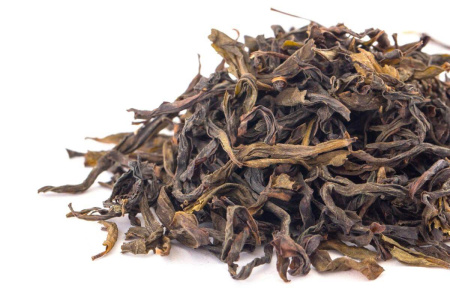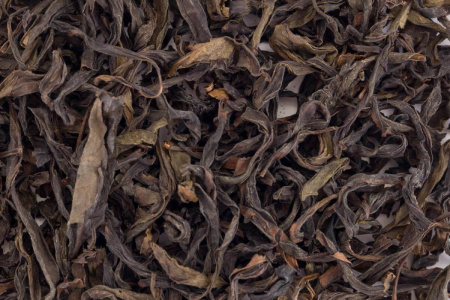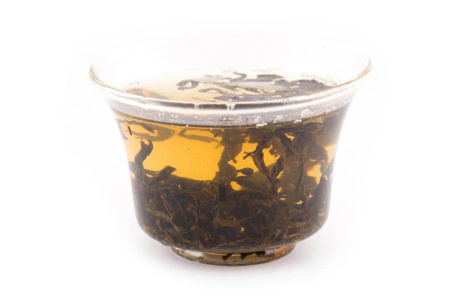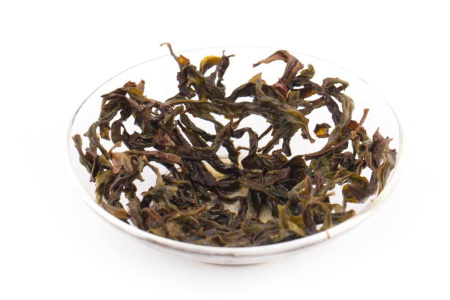-
9 Saturation
-
9 Aftertaste
-
9 Aroma
-
9 Effect
-
9 Balance
-
9 Body
'Huang Meigui' (黄玫瑰, huáng méigui, or 'Yellow Rose') is a small, tree-like variety with medium-sized leaves. It is an early-ripening cultivar and an asexual (cloned) variety. Buds and leaves are yellow-green, open densely, young shoots are dense, and yield is more than 20% higher than that of the control variety 'Huang Dan' (黄旦, huáng dàn). Excellent quality, with a rich and aromatic flavor, high spiciness, and a soft and sweet aroma. High quality. The spring harvest period for 'Yellow Rose' tea is from April to May. It has good propagation by cuttings and a high survival rate. It is frost- and drought-resistant, adapts easily, and is suitable for further cultivation in other areas of Fujian Province.
'Huang Meigui' is a hybrid of two varieties: 'Huang Guanyin' (黄观音, huáng guānyīn, "Yellow Bodhisattva of Compassion") and 'Huang Dan' (黄旦, huáng dàn, "Yellow Morning/Yellow Dawn"), also known as 'Huang Yan' (黄棪, huáng yǎn).' According to other sources, 'Yellow Rose' is a hybrid of 'Huang Dan' and 'Huangjin Gui' (黄金桂, huángjīn guì, "Golden Osmanthus" or "Golden Cinnamon"). Along with Huangmeigui, Wuyishan names such as Zi meigui (紫玫瑰, zǐ méigui, "Purple Rose") and Zi mudan (紫牡丹, zǐ mǔdan, "Purple Peony") were also registered.
Produced using traditional techniques from the Wuyi Mountains (武夷山, wǔyíshān). It has a distinctive floral aroma and a "hui gan" (回甘, huígān, "turning into sweet") flavor—that is, the tea is initially astringent and astringent, then gradually turns sweet. The roasting and oxidation levels of the tea are low.
What makes Yancha (岩茶 yánchá) stand out among other cliff teas is its unique rose flower aroma.
In 2005, the cultivar was officially certified as a new local variety by the Ministry of Agriculture of China.
This tea has a light, delicate floral flavor. The dry aroma is reminiscent of sweet pastries and spicy croutons. The moist aroma reveals sweet, fruity notes. When served with tea, it reveals floral and smoky notes. When brewed gently, the flavor is slightly sweet and tart. A more robust brew reveals baked notes. The infusion of Huang Mei Gui tea is orangey and clear.
It is also called “Yancha Jie De Xingui” (岩茶界的新贵, yánchá jiè de xīnguì) – “New Jewel / New Aristocrat of the Cliff Tea World”.
When dry, the tea has a warm aroma, revealing floral and chocolate notes with hints of sun-dried blackcurrant leaves. After washing, the aroma intensifies, with steamed leaves imparting aromas of dried fruit and cocoa beans.
The brewed tea has a delicate and balanced flavor, fruity and floral, with a slight bitterness and hints of ripe gooseberry. This tea holds its steeps evenly, strives to maintain its flavor profile as much as possible, and is steeped up to five times, gradually fading. To brew, use 5-7 grams of tea per 150-200 ml of water in a Yixing clay teapot or gaiwan, and water at 90-95°C.
The tea leaves a light, refreshing, moderately sweet aftertaste, reminiscent of flower nectar. The finished infusion is a deep lemon color, clean and clear.
When sipped, Huang Mei Gui (Yellow Rose) gently invigorates, slowly warms the body, invigorates socializing, and sobers the mind. This tea is perfect for everyday drinking in good company on cold, sultry evenings, or for a good start to the day.
|
Name in Chinese
|
黄玫瑰 |
|
Pinyin
|
huáng méigui |
|
Translation
|
Yellow rose |
|
Country
|
China |
|
Provinces
|
Fujian (福建) |
|
Habitat
|
Уишань Баньян (武夷山半岩, wǔyíshān bànyán) |
- Reviews
- Vkontakte


















































































